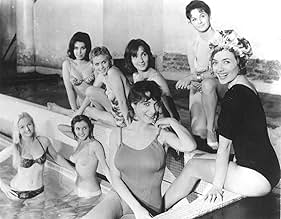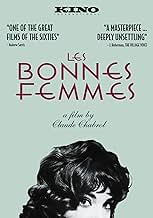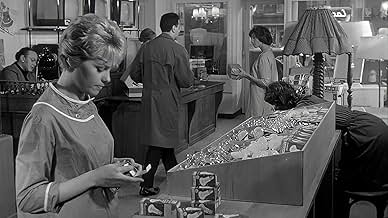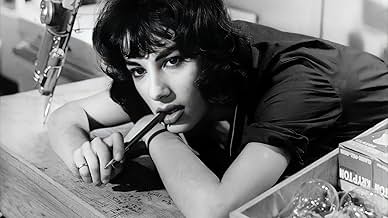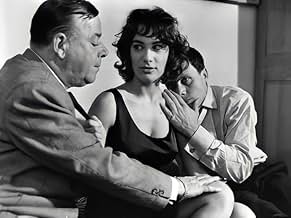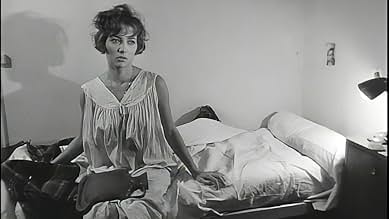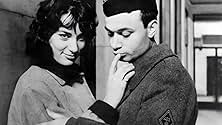NOTE IMDb
7,2/10
3,3 k
MA NOTE
Ajouter une intrigue dans votre langueFour Parisian women navigate the world of romance and daily life looking to fulfill their dreams but often find real-life to be inescapable.Four Parisian women navigate the world of romance and daily life looking to fulfill their dreams but often find real-life to be inescapable.Four Parisian women navigate the world of romance and daily life looking to fulfill their dreams but often find real-life to be inescapable.
- Réalisation
- Scénario
- Casting principal
- Récompenses
- 1 nomination au total
Gabriel Gobin
- Le père d'Henri
- (as Gabriel Gobain)
Avis à la une
i liked this film. it has an ambigious quality about it, almost paradoxical. it has a feel of a documentary and is observational in nature, yet there is a obvious message or view taken by chabrol and the women in this film. they're doomed objects of desire for men. the women have this elusive quality about them, they're beautiful and somewhat misguided about the men in thier lives. they seem unattainable, yet vulnerable to a ominous unspoken danger that awaits them that is denoted by the music. there's this creepy yet mysterious sounding music that runs through the film when the female characters roam through the streets. and for some reason, all the men in this movie are misogynist jerks! they disrespect these women and believe they're entitled to them. yet, these women flirt with them and passively resist them for most of the film. chabrol lovingly shoots these women and has affection for them, but also sadness at their romantic naivety about the men in their lives that will bring them doom.
Les bonnes femmes (1960), directed by Claude Chabrol, was shown in the U.S. with the title The Good Time Girls. The film depicts the lives of four Parisian shopgirls. (I guess now we would call them retail clerks, but in 1960 they were shopgirls.)
The women are all looking for romance, and they do no one any harm, but their lives are not filled with the glamor and excitement that the term "good time girls" evokes. They go to music halls, public swimming pools, and the zoo. They let men cruising by in cars pick them up. They stay out all night and stumble half asleep into work the next day. One of them is pursued and courted by a mysterious motorcyclist.
All four young women are attractive. Three of them went on to have important careers in the French cinema--Bernadette Lafont , Clotilde Joano, and Stéphane Audran. (Audran later married director Chabrol,)
Although Chabrol is a superb director, and the actors are talented, the film just didn't work for me. The young women had vacant lives, they had no aspirations or dreams of something different, and they had a naiveté that was sad rather than charming.
This is a movie worth seeing if you have a particular interest in the French New Wave, in Claude Chabrol, or in the young actors who were not yet major stars. I wouldn't seek it out as casual viewing. We saw it on VHS, and it worked well on the small screen.
The women are all looking for romance, and they do no one any harm, but their lives are not filled with the glamor and excitement that the term "good time girls" evokes. They go to music halls, public swimming pools, and the zoo. They let men cruising by in cars pick them up. They stay out all night and stumble half asleep into work the next day. One of them is pursued and courted by a mysterious motorcyclist.
All four young women are attractive. Three of them went on to have important careers in the French cinema--Bernadette Lafont , Clotilde Joano, and Stéphane Audran. (Audran later married director Chabrol,)
Although Chabrol is a superb director, and the actors are talented, the film just didn't work for me. The young women had vacant lives, they had no aspirations or dreams of something different, and they had a naiveté that was sad rather than charming.
This is a movie worth seeing if you have a particular interest in the French New Wave, in Claude Chabrol, or in the young actors who were not yet major stars. I wouldn't seek it out as casual viewing. We saw it on VHS, and it worked well on the small screen.
In Paris, Jane (Bernadette Lafont) and her colleague and roommate Jacqueline (Clotilde Joano) are walking home when the friends Marcel (Jean-Louis Maury) and Albert (Albert Dinan) hit on them and invited them to go to a restaurant. Later, Jacqueline goes home while Jane goes to Albert's apartment and has a threesome. On the next morning, they go to the appliance store Maison Belin where they work with Ginette (Stéphane Audran), Rita (Lucile Saint-Simon) and the spinster Mme Louise (Ave Ninchi), who is the cashier. The owner Monsieur Belin (Pierre Bertin) is an abusive boss, and they hate their work. Jane has a boyfriend but is a promiscuous party girl. Ginette has a secret life at night, singing in a music hall. Rita has a bourgeois fiancé, Henri (Sacha Briquet), who does not respect her and believes she is empty. Jacqueline is naive and believes in love, and when a biker follows her everywhere with his motorcycle, she believes he is her shy prince charming. When Jacqueline meets him at a public swimming pool, they introduce themselves to each other and the biker Ernest Lapierre (Mario David) dates her. They go to a remote restaurant in the countryside, and he asks her why she dated him without knowing him. But soon Jacqueline learns who he is.
"Les bonnes femmes" (1960), a.k.a. "The Good Time Girls", is the fourth film by Claude Chabrol disclosing the dull life of four young working-class women in the job at an appliance store. Their moments of joy are after hours, each one with a lifestyle. Jane is a promiscuous woman; Rita does not have self-respect; Ginette likes to sing in a music hall; and Jacqueline, who seems to be the youngest, is a dreamer. In common, they are treated like objects. It is funny to see how silly some men like Marcel and Albert were in those years in Paris. The conclusion is a great surprise from Chabrol. My vote is seven.
Title (Brazil): "Mulheres Fáceis" ("Easy Women")
"Les bonnes femmes" (1960), a.k.a. "The Good Time Girls", is the fourth film by Claude Chabrol disclosing the dull life of four young working-class women in the job at an appliance store. Their moments of joy are after hours, each one with a lifestyle. Jane is a promiscuous woman; Rita does not have self-respect; Ginette likes to sing in a music hall; and Jacqueline, who seems to be the youngest, is a dreamer. In common, they are treated like objects. It is funny to see how silly some men like Marcel and Albert were in those years in Paris. The conclusion is a great surprise from Chabrol. My vote is seven.
Title (Brazil): "Mulheres Fáceis" ("Easy Women")
Claude Chabrol made a film before Les bonnes femmes, Les Cousins, which is what made him known as part of the French New Wave (he preceded Truffaut and Godard by a year). But viewing Les bonnes femmes before seeing Les Cousins, I almost feel like this is a director's first film, for a director like Chabrol, as it shows a lot of his concerns as a filmmaker: an observational stance with women, their sexuality and their distance from the opposite sex, the mundane in a bourgeois life, and the Hitchcock angle of danger and the unknown. It's also in line with the other Nouvelle Vague films in the sense that the filmmaker has broken out of any ties to a studio or sets, and everything is out in the streets or on location in places like nightclubs and music halls and swimming pools, and usually with hand-held cameras and (seeming) improvisation with the actors. This is a gritty, on-the-streets Chabrol one isn't used to from seeing films like This Man Must Die and The Butcher.
And yet I don't know if I can say it's as great as the big early films of the period like The 400 Blows and Breathless. Chabrol's film does carry, I'm sure, some personal weight. And he's interested in these girls, their casual life and goings-on, and how so easily one of them can be lured by a mysterious man in a mustache who follows them around in a motorcycle. But it's such a loosely structured film- barely a plot, even less, if you can imagine, than Breathless- that it takes a moment for us to realize something is going on. Which perhaps is part of Chabrol's angle here: like Fellini's film I Vitelloni, we're just watching these four girls in their everyday occurrences, going to a zoo, going to a nightclub and hooking up with two (obnoxious) strangers, going to a music gall where one of the girls is secretly singing and doesn't want to go on for fear of embarrassment of the others seeing her, and just walking around. Or, as well, the complacency of working at a TV store where no one comes in.
We are drawn in to these girls and who they are, however limited they're really shown as full characters (more-so Chabrol is interested, I think, in these girls as 'types' possibly, or in looking at them in a semi-documentary perspective). And metaphor is used from time to time; I'm sure the visit to the zoo, and Chabrol's carefully timed and composed reaction shots of the animals in the cages, is deliberate as to the girls' own self-prison of 20-something frivolity. And there's also the matter, again, of the motorcycle guy, who somehow charms this girl. Actually not somehow, as in this sort of Nouvelle Vague film-world it's precisely the kind of guy a girl would fall for, even one seemingly so uptight as the one he goes after. Seeing how this plays out between them can go one of two ways, and how Chabrol shows it in the last fifteen minutes is totally masterful. There's a sense of the inevitable, but he keeps us uncertain as an audience, which is good. I'm glad I couldn't quite see where the ending would go, though when it came it made sense and was satisfying (it even raised up the worth of the film overall a full notch).
But a masterpiece? Probably not. It's like a breezy fling through a Parisian quarter, on the dark streets and cool nights with beautiful girls and not-so-beautiful but flirty men, and it has some wonderful moments. It just doesn't add up completely into something that makes you want to shake your friend up and say "You MUST watch this!" like 400 Blows, or even The Butcher.
And yet I don't know if I can say it's as great as the big early films of the period like The 400 Blows and Breathless. Chabrol's film does carry, I'm sure, some personal weight. And he's interested in these girls, their casual life and goings-on, and how so easily one of them can be lured by a mysterious man in a mustache who follows them around in a motorcycle. But it's such a loosely structured film- barely a plot, even less, if you can imagine, than Breathless- that it takes a moment for us to realize something is going on. Which perhaps is part of Chabrol's angle here: like Fellini's film I Vitelloni, we're just watching these four girls in their everyday occurrences, going to a zoo, going to a nightclub and hooking up with two (obnoxious) strangers, going to a music gall where one of the girls is secretly singing and doesn't want to go on for fear of embarrassment of the others seeing her, and just walking around. Or, as well, the complacency of working at a TV store where no one comes in.
We are drawn in to these girls and who they are, however limited they're really shown as full characters (more-so Chabrol is interested, I think, in these girls as 'types' possibly, or in looking at them in a semi-documentary perspective). And metaphor is used from time to time; I'm sure the visit to the zoo, and Chabrol's carefully timed and composed reaction shots of the animals in the cages, is deliberate as to the girls' own self-prison of 20-something frivolity. And there's also the matter, again, of the motorcycle guy, who somehow charms this girl. Actually not somehow, as in this sort of Nouvelle Vague film-world it's precisely the kind of guy a girl would fall for, even one seemingly so uptight as the one he goes after. Seeing how this plays out between them can go one of two ways, and how Chabrol shows it in the last fifteen minutes is totally masterful. There's a sense of the inevitable, but he keeps us uncertain as an audience, which is good. I'm glad I couldn't quite see where the ending would go, though when it came it made sense and was satisfying (it even raised up the worth of the film overall a full notch).
But a masterpiece? Probably not. It's like a breezy fling through a Parisian quarter, on the dark streets and cool nights with beautiful girls and not-so-beautiful but flirty men, and it has some wonderful moments. It just doesn't add up completely into something that makes you want to shake your friend up and say "You MUST watch this!" like 400 Blows, or even The Butcher.
Chabrol's career is often seen as moving from the naturalism of his early films to the extreme stylisation of his great mid-period. It's not as simple as that, but in 'Les Bonnes Femmes', Chabrol achieves a balance between the two that he has rarely equalled. The story of four shopgirls, their work and social lives, has all the plotless and poignant banality of realism, while the closing third, with its move from Paris to the country, its seducer-cum-motorbike-riding-devil (reg. no.: 666) talking about the Creator, as little schoolboys called Balthasar pass by; and its closing vision of Hell/Purgatory bespeak a more Cocteau-like world of mythology and religion. But there is Cocteau too in the framing of Jacqueline in the shop window, while Chabrol's filming of treacherous nature later on is uncommonly vivid. Although 'Bonnes' is his least typical film, it is also his most lovable, and seems to get richer with the years.
Le saviez-vous
- AnecdotesCaused so much resentment among the public upon its release that some went as far as breaking seats in theaters as sign of protest.
- GaffesAfter Ernest strangles Jacqueline, he rips his coat out from under her and flips her over. The supposedly dead Jacqueline immediately moves her arm to catch herself from going face first into the mud.
- Citations
Monsieur Belin: My pleasure in life is to reprimand little girls... It's my prerogative.
- ConnexionsFeatured in Le fils de Gascogne (1995)
Meilleurs choix
Connectez-vous pour évaluer et suivre la liste de favoris afin de recevoir des recommandations personnalisées
- How long is The Good Girls?Alimenté par Alexa
Détails
Box-office
- Montant brut aux États-Unis et au Canada
- 6 578 $US
- Week-end de sortie aux États-Unis et au Canada
- 6 578 $US
- 15 août 1999
- Durée1 heure 40 minutes
- Couleur
- Rapport de forme
- 1.66 : 1
Contribuer à cette page
Suggérer une modification ou ajouter du contenu manquant

